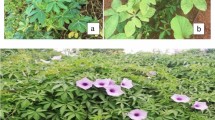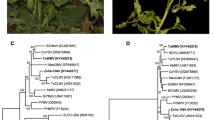Abstract
Foliar samples were collected from the tomato (Solanum lycopersicum) cultivar ‘IPA-6’ exhibiting begomovirus-like symptoms (apical leaf curling and chlorosis) in Iranduba (Brazilian Amazon). PCR tests with degenerate primers targeting DNA–A and DNA–B components of a sample designated as AM–035 were positive for both genomic regions. Full-length cognate DNA–A and DNA–B components of AM–035 were cloned and sequenced via Sanger dideoxy termination reaction. The complete sequence of the DNA–A component (MK878452) comprised 2,630 nucleotides (organized in five open reading frames – ORFs), and the DNA–B component (MK878451) displayed 2,593 nucleotides (two ORFs). The highest identities ranged from 90 to 92% with tomato chlorotic mottle Guyane virus (ToCMoGV) isolates from French Guiana, indicating a highly divergent Brazilian strain of this virus. The present work reinforces the scenario of the high diversity of tomato-infecting begomoviruses in Brazil. Further studies are needed to determine the distribution and prevalence of ToCMoGV across tomato-producing areas in the Brazilian Amazon River Basin.


Similar content being viewed by others
References
Duarte, M. F., Fonseca, M. E. N., Costa, H., Fernandes, N. A., Reis, A., Boiteux, L. S., & Pereira-Carvalho, R. C. (2021). Diversity of tomato-infecting begomoviruses and spatiotemporal dynamics of an endemic viral species of the Brazilian Atlantic rain forest biome. Virus Genes, 57, 83–93.
Giordano, L. B., Silva-Lobo, V. L., Santana, F. M., Fonseca, M. E. N., & Boiteux, L. S. (2005). Inheritance of resistance to the bipartite tomato chlorotic mottle begomovirus derived from Lycopersicon esculentum cv. ‘Tyking.’ Euphytica, 143, 27–33. https://doi.org/10.1007/s10681-005-1685-1
Kearse, M., Moir, R., Wilson, A., Stones-Havas, S., Cheung, M., Sturrock, S., Buxton, S., Cooper, A., Markowitz, S., & Duran, C. (2012). Geneious Basic: An integrated and extendable desktop software platform for the organization and analysis of sequence data. Bioinformatics, 28, 1647–1649. https://doi.org/10.1093/bioinformatics/bts199
Lett, J. M., De Bruyn, A., Hoareau, M., Ouattara, A., Claverie, S., Dalmon, A., Laplace, D., Lefeuvre, P., & Hostachy, B. (2015). Tomato chlorotic mottle Guyane virus: A novel tomato-infecting bipartite begomovirus from French Guiana. Archives of Virology, 160, 2887–2890. https://doi.org/10.1093/bioinformatics/bts199
Martin, D. P., Varsani, A., Roumagnac, P., Botha, G., Maslamoney, S., Schwab, T., Kelz, Z., Kumar, V., & Murrell, B. (2021). RDP5: A computer program for analyzing recombination in, and removing signals of recombination from, nucleotide sequence datasets. Virus Evolution, 7, 1–3. https://doi.org/10.1093/ve/veaa087
Melgarejo, T. A., Kon, T., & Gilbertson, R. L. (2015). Molecular and biological characterization of distinct strains of Jatropha mosaic virus from the Dominican Republic reveal a potential to infect crop plants. Phytopathology, 105, 141–153. https://doi.org/10.1094/PHYTO-05-14-0135-R
Pereira-Carvalho, R. C., Boiteux, L. S., Fonseca, M. E. N., Díaz-Pendón, J. A., Moriones, E., Fernández-Muñoz, R., Charchar, J. M., & Resende, R. O. (2010). Multiple resistance to Meloidogyne spp. and to bipartite and monopartite Begomovirus spp. in wild Solanum (Lycopersicon) accessions. Plant Disease, 94, 179–185. https://doi.org/10.1094/PDIS-94-2-0179
Reis, L. N. A., Fonseca, M. E. N., Ribeiro, S. G., Naito, F. Y. B., Boiteux, L. S., & Pereira-Carvalho, R. C. (2020). Metagenomics of Neotropical single-stranded DNA viruses in tomato cultivars with and without the Ty-1 gene. Viruses, 12, 819. https://doi.org/10.3390/v12080819
Reis, L. N. A., Boiteux, L. S., Fonseca, M. E. N., & Pereira-Carvalho, R. C. (2021). Tomato yellow vein streak virus and tomato golden vein virus: A reappraisal of the classification status of two South American Begomovirus species based upon genome-wide pairwise identity of multiple isolates. Virus Genes, 57, 127–131. https://doi.org/10.1007/s11262-020-01810-z
Reis, L. N. A., Boiteux, L. S., Fonseca, M. E. N., Rojas, M. R., Gilbertson, R., & Pereira-Carvalho, R. C. (2023). Tomato golden net virus and tomato yellow net virus: Two novel New World begomoviruses with monopartite genomes. Archives of Virology, 168, 235.
Acknowledgements
The authors are grateful to the financial support of Capes (Coordenação de Aperfeiçoamento de Pessoal de Nível Superior), CNPq (Conselho Nacional de Desenvolvimento Científico e Tecnológico), FAP-DF (Fundação de Apoio à Pesquisa do DF), and Embrapa (Empresa Brasileira de Pesquisa Agropecuária). The authors would like to thank Antonio Francisco Costa (CNPH—Embrapa Hortaliças) for their help and support in Sanger dideoxy termination reaction sequencing. We are deeply grateful to anonymous reviewers for their invaluable suggestions.
Funding
Financial support was provided by grants from Embrapa (Empresa Brasileira de Pesquisa Agropecuária), CNPq (Conselho Nacional de Desenvolvimento Científico e Tecnológico), and FAP-DF (Fundação de Apoio à Pesquisa do Distrito Federal). This study was also financed in part by the Coordenação de Aperfeiçoamento de Pessoal de Nível Superior (CAPES), Finance Code 001.
Author information
Authors and Affiliations
Contributions
Conceptualization, I.A.O., M.E.N.F.B., L.S.B. and R.C.P.C.; methodology, I.A.O., M.R.R., A.R., G.R.L., V.P.M.R.V., and R.C.P.C.; software, L.N.A.R., I.A.O. and R.C.P.C.; validation, R.C.P.C.; formal analysis, I.AO., R.C.P.C.; and L.N.A.R.; investigation, I.A.O., N.A.N.F., R.C.P.C., and V.P.M.R.G., resources, R.C.P.C., data curation, R.C.P.C., M.E.N.F.B., L.S.B., writing—original draft, I.A.O., L.S.B. and R.C.P.C.; preparation, I.A.O., L.R.G., L.S.B. and R.C.P.C.; writing—review and editing, M.R.R., R.L.G., I.A.O., L.S.B. and R.C.P.C.; visualization, L.S.B. and R.C.P.C.; supervision, L.S.B. and R.C.P.C.; project administration, R.L.G., L.S.B. and R.C.P.C.; funding acquisition, R.L.G., M.E.N.F.B., L.S.B. and R.C.P.C. All authors have read and agreed to the published version of the manuscript.
Corresponding author
Ethics declarations
Competing interests
The authors declare no competing interests.
Additional information
Publisher's Note
Springer Nature remains neutral with regard to jurisdictional claims in published maps and institutional affiliations.
Rights and permissions
Springer Nature or its licensor (e.g. a society or other partner) holds exclusive rights to this article under a publishing agreement with the author(s) or other rightsholder(s); author self-archiving of the accepted manuscript version of this article is solely governed by the terms of such publishing agreement and applicable law.
About this article
Cite this article
de Oliveira, I.A., dos Reis, L.d.N.A., Nery, F.M.B. et al. Genomic characterization of a highly divergent tomato chlorotic mottle Guyane virus strain in the Brazilian Amazon River Basin. Phytoparasitica 52, 13 (2024). https://doi.org/10.1007/s12600-024-01122-0
Received:
Accepted:
Published:
DOI: https://doi.org/10.1007/s12600-024-01122-0




